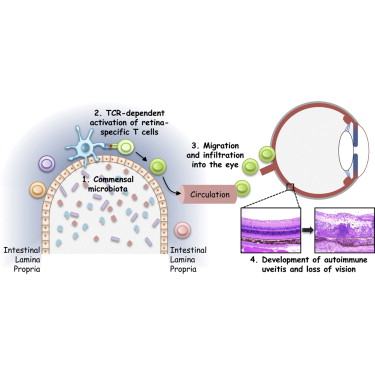Gut Bacteria Can Cause Blindness

Scientists from the US National Eye Institute (NEI) have found that gut bacteria can trigger autoimmune uveitis, a disease that causes eye inflammation and eventually can lead to blindness. Gut microbiota can activate, via T cell receptors (TCR), specific retinal T cells that then migrate to the eye and generate autoimmune imflammation and loss of vision. The finding was published in the journal Immunity.
Uveitis is the inflammation of the uvea, the pigmented layer between the inner retina and the outer fibrous layer composed of the sclera and cornea.The uvea contains vascular structures and includes the iris, ciliary body, and choroid. The onset of autoimmune uveitis is due to a failure of the ocular immune system and the disease results from inflammation and tissue destruction. Uveitis is driven by the Th17T cell sub-population that bear T-cell receptors specific for proteins found in the eye. But T cells can not access the ocular area where these antigens are, so the activation must come from somewhere else. The researchers at NEI used a uveitis-prone mouse model and found that the animal guts increased its T cell activation before the uveitis outbreak. When they lowered the gut microbiota by administering antibiotics, uveitis was slowed down and activated T cell numbers were lower. the research team also extracted bacteria from the instestines and shpwed that it caused uveitis.
The authors think that the intestines microbes produce a substance that T-cells mistake as a protein from the retina, but were unable to identify the molecule.
Source: National Eye Institute



